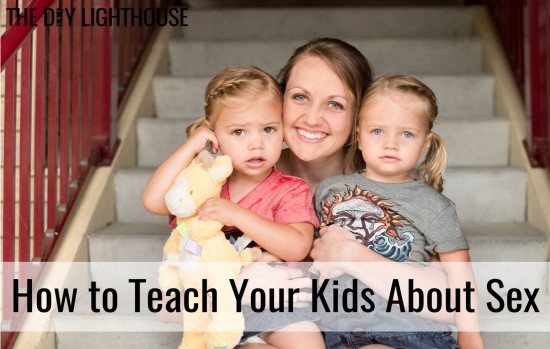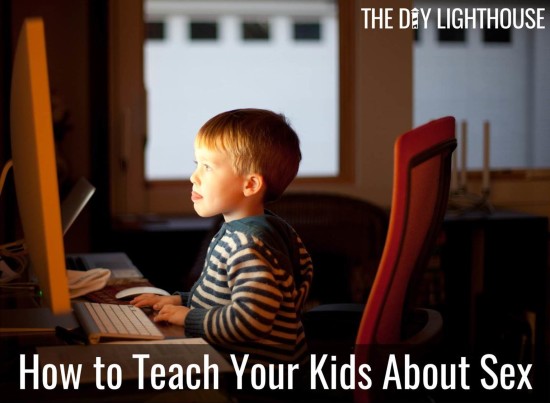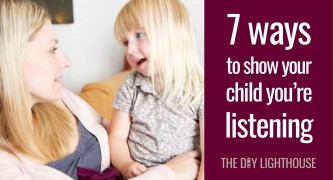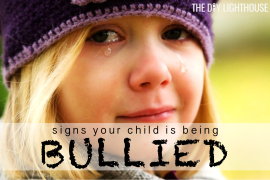
Kids are being exposed to sexually explicit images and conversation earlier and earlier—at school, at sleepovers, on the internet, everywhere. In fact, 93% of boys and 62% of girls view pornography before they are 18; some are exposed as early as age 8.[1] “The talk” is no longer enough. For parents, this can be frightening. But it doesn’t have to be! Here are 8 principles for teaching your kids about sex:
1. Start early
Don’t wait until they’ve already heard and seen things about sex from peers and the media. When kids are toddlers, teach them the names of their body parts. Instill within them an appreciation for their bodies and everything they can do. Then as they age, conversations will naturally mature to talks about pregnancy and babies, and eventually sex.
2. Facilitate frequent, open dialogue
Kids need much more than just “the talk”. Take advantage of everyday teaching moments to keep the dialogue open. The magazines at the store checkout line. A couple kissing in a movie. Planet Earth episodes on mating. These are all potential moments for teaching kids about sexuality and inviting them to open up to you about their thoughts and feelings.
3. Don’t be embarrassed or uncomfortable
Or at least don’t let it show. If your kids sense you are uncomfortable talking about sex, masturbation, or their developing body, they will stop coming to you. They will turn to friends and the internet for answers to their questions. If you freak out when they tell you they like someone at school, they will stop telling you about it. One way to become comfortable talking about sex is to practice saying what you want to say to your child in front of a mirror over and over until it feels natural.
4. Use the appropriate terms
Using nicknames for body parts or sexual acts conveys to kids that you are uncomfortable talking about it, it is inherently dirty and inappropriate, and it is not important or special enough to use the real name. Teach them about their penis, vagina, breasts, testicles, and nipples. Do not talk about it lightly, but treat it like something important and special—something that deserves to be called by its true name. They will learn to do the same. Again, if you feel uncomfortable saying these words, practice in front of a mirror on your own first.
5. Talk about more than just sex
Intercourse is just part of healthy sexuality. Topics such as puberty, hygiene, pornography, attraction, and sexual responses should be part of your ongoing conversation. Kids have a natural curiosity about their body that is normal and healthy. They have a right to understand it and be prepared for every aspect of sexuality.
6. Give honest information
Your kids need to know that they can always come to you with questions about sex, and that you will always give them accurate information. If you are surprised by a question, do not know the answer, or do not know how to respond, tell them that you appreciate that they came to you, you will think about it, and you will talk to them about it soon. Look it up if you need to—better you than them. But always answer their questions, and always get back to them if you say you will.
7. Give age-appropriate information
If your toddler asks you where babies come from, you don’t need to launch into a lecture on the intricacies of sex. Tell them that when two parents love each other and decide to have a baby, they hold each other tight and there is a seed in daddy’s body that finds a seed in mommy’s body, and together they create a little baby that grows in mommy’s uterus. Always give accurate information, but channel it to your kid’s age, maturity, and sexual knowledge. By the time kids are 8 or 9, they should know more specifics about sex, and they should be prepared to encounter pornography by knowing what it is and what to do when they come across it. Make sure they know they can come to you.
8. Tell them why
To instill within your kids your values, they must not only know how they should act but why they should act that way. You can give kids information, but until they understand the “why” behind that information, it is meaningless. Kids want to know why they should wait to have sex, why their body is changing, why it might be bad for them to see pornography, and why sex is a wonderful thing. Initiate those conversations because often kids are reluctant to reveal their insecurities and curiosities.
Some people think that teaching kids about sex will make them curious and promote risky behaviors. This is not the case. By preparing kids, they are more likely to have a healthy attitude towards sexuality and avoid risky behaviors.[2] Don’t leave them to the information they are bombarded with from friends and the media. Be a proactive, significant part of your kids’ sex education. They will thank you for it, and you will have a deeper relationship because of it. [3]
 Ashley LeBaron is a Family Studies graduate from Brigham Young University. She is preparing to be a professor, marriage & family therapist, and mom. Ashley has published and presented research on topics such as emotional reconnection between spouses and how parents teach their kids about money. In her observation of families in 22 countries, she has found that family is where the greatest happiness and success is cultivated.
Ashley LeBaron is a Family Studies graduate from Brigham Young University. She is preparing to be a professor, marriage & family therapist, and mom. Ashley has published and presented research on topics such as emotional reconnection between spouses and how parents teach their kids about money. In her observation of families in 22 countries, she has found that family is where the greatest happiness and success is cultivated.
Sources:
[1] Sabina, C., Wolak, J., & Finkelhor, D. (2008). The nature and dynamics of internet pornography exposure for youth. CyberPsychology and Behavior, 11(6), 691-693. doi:10.1089/cpb.2007.0179
[2] Guilamo-Ramos V, Bouris A. Parent Adolescent Communication about Sex in Latino Families: A Guide for Practitioners. The National Campaign to Prevent Teen and Unplanned Pregnancy. Jan 2008.
[3] Many of the ideas in this article were adapted from Tammy Hill, LMFT and How to Talk to Your Child About Sex by Linda and Richard Eyre



